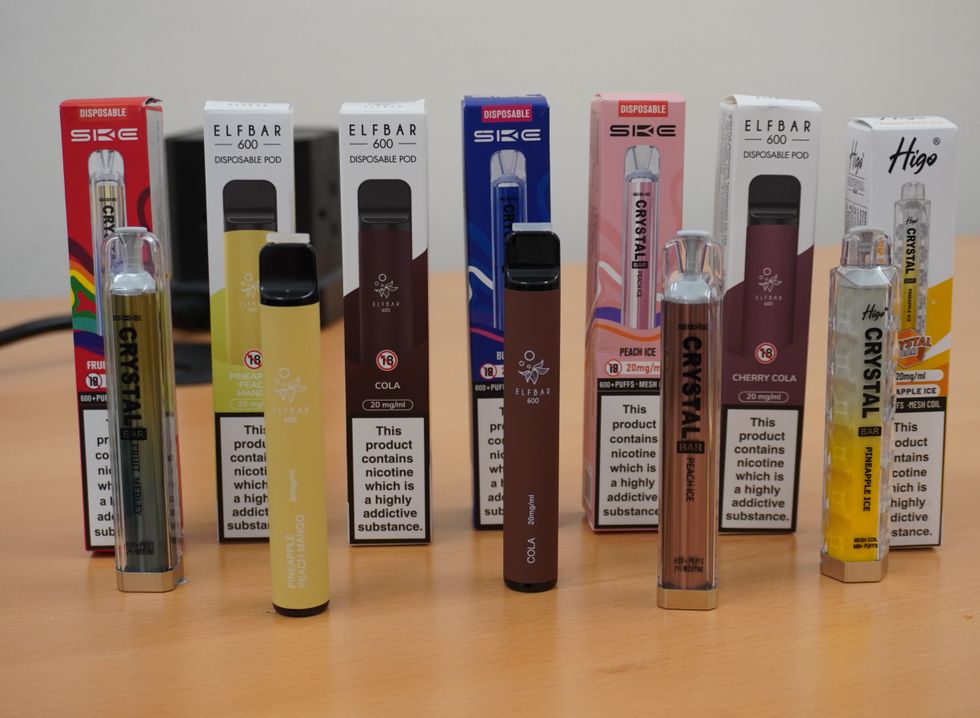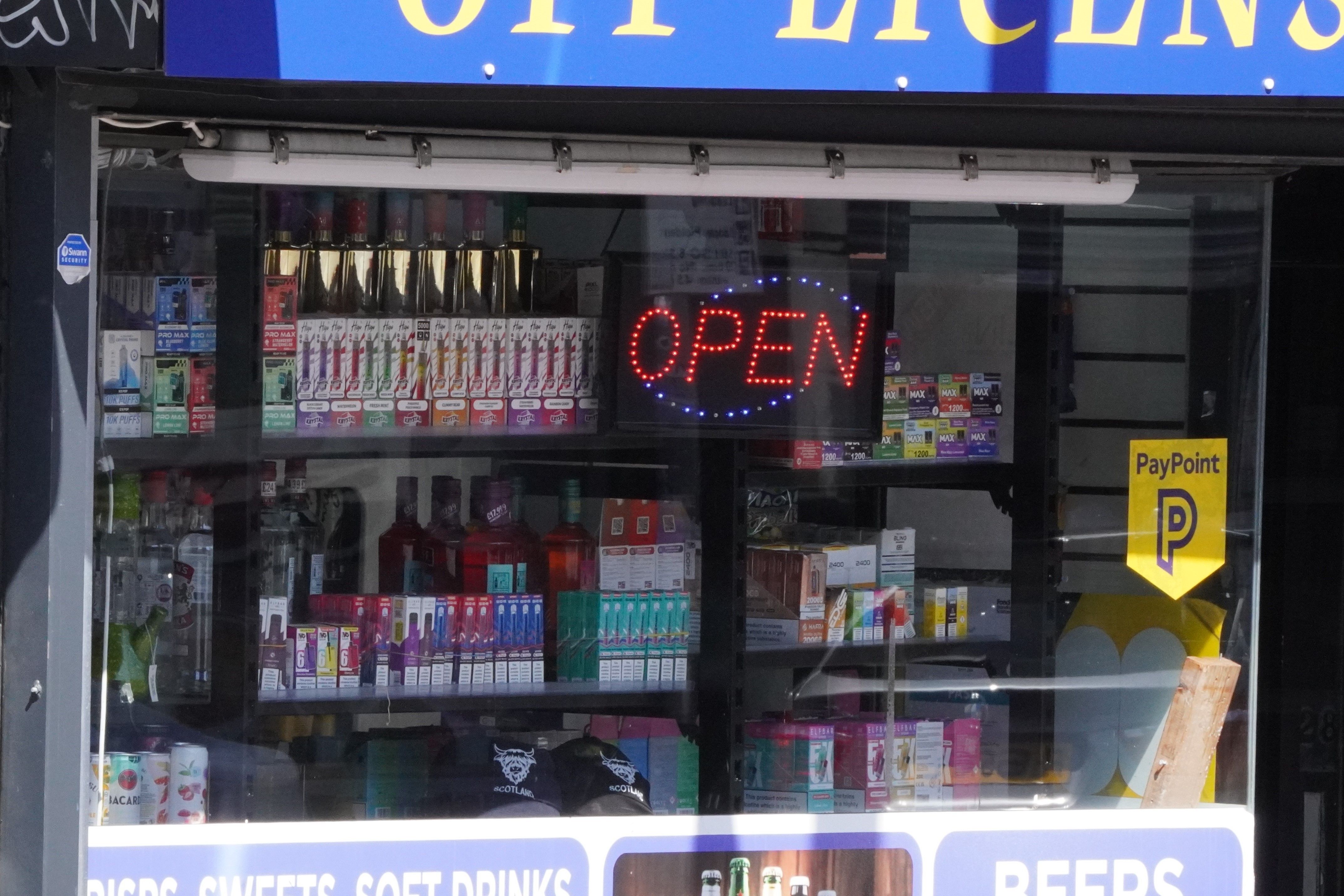- Shops in Edinburgh are still selling single use vapes, despite them being banned across the country over a month ago.
- Many shop workers acknowledged they were illegal to sell when asked by an undercover reporter.
- Local authorities are tasked with enforcing the ban, but resources are limited..
Shops across Edinburgh are still selling single use vapes – over a month after they were banned across the country.
The Local Democracy Reporting Service (LDRS) was able to buy seven at sites around the city, with many shops still carrying them in public view.
Many shop workers acknowledged they were illegal to sell when asked by an undercover reporter, with one saying customers sought them out because they ‘liked the taste’.
Others said they were working on clearing out stock, while a handful pled ignorance, saying they did not know the vapes were illegal.
The ban was brought in on 1 June of this year by the Scottish government over public health and environmental well-being grounds.
Similar bans came into effect in England, Wales and Northern Ireland on the same day, with the Scottish ban delayed by two months to line up the start date nationwide.
It had been announced in Scotland in early 2024, giving manufacturers and retailers time to adapt to the change.
To be legal, vapes need to be rechargeable, and have the ability for the vape liquid and heating elements inside to be replaced.
Vape manufacturers have responded by creating new lines of products that visibly resemble their old disposable ones, but which feature charging ports and disposable pods that contain liquid and new heating elements.
Local authorities have been tasked with enforcing the ban – though a council report in May said the city’s trading standards team would need more resources to investigate disposable vapes without reducing their other services.
Having seen several stores appearing to stock disposable vapes weeks after the ban came into effect the LDRS carried out test purchasing at sites across the city.
Customers still prefer old disposable units
At one popular city centre retailer, the LDRS asked if the store had any disposable vapes on hand. A cashier obliged, and took out ten disposable vapes, laying them out on the counter for us to take our pick.
He acknowledged that they were illegal, but said that customers seemed to prefer the taste of the old disposable units over the refillable equivalents many companies have released.
He said: “The only difference is the battery. But people still want these, they like the taste I think.”
The vape the LDRS bought there, a Higo Crystal bar, lacks a charging port or a way to replace the liquid inside, making it illegal under the new law.
Returning a couple days later, the same shopkeeper denied he sold us the vape, and said the shop did not stock or carry ones not compliant with the ban.
At a Southside convenience store, the LDRS were able to ask for a cola-flavoured Elf Bar right off the shelf without issue.
When asked if the vape was illegal, the cashier there confirmed it was. He said the store was working on clearing out its stock, and that refills for the newer vapes were hard to obtain.
He continued on to say: “People don’t care [whether the vape is disposable], they’re the same. The law is pointless without having the refills.”

The story was the same at another two city centre newsagents, where we were able to buy a disposable peach ice SKE bar and a disposable cherry cola Elf Bar.
One shopkeeper there told the LDRS: “The [refill] pods are hard to get. Our supplier doesn’t stock them, we can’t buy them.”
The issue of what is legal and illegal was one which seemed to be causing some shopkeepers trouble. At another city centre newsagent the LDRS were able to purchase a pineapple peach mango Elf Bar – and when asked if it was compliant with the ban, the shopkeeper seemed to believe it was, telling us, “you can change the pods”.
He was confused when we removed the vape from its packaging, and pointed out that it had no charger or removable refill pods.
When we went back to the shop, a different shop worker also thought the vape was legal, saying they had received the non-compliant Elf Bars as part of a shipment two weeks ago.
The LDRS were also able to buy non-compliant vapes at two more shops in the city, with both stocking them quite openly.
All seven stores were asked for comment, however none had responded.
At each store the LDRS asked for a receipt, however most declined to provide them, with some saying they were out of receipt paper and others providing no explanation as to why one could not be given.
The LDRS has now passed its dossier of evidence on to Edinburgh Council’s trading standards team, who are investigating.
The LDRS also checked some chain supermarkets for vapes – and managed to find one, the Sainsbury’s on Shandwick Place – stocking disposable ones.
However, when a cashier tried to ring up the vape, his terminal would not allow him to scan the product. He then cleared the remaining disposable vapes from the shelf behind him.
A spokesperson for Sainsbury’s said the firm took its “role as a responsible retailer very seriously”, and that it ensures all its stores are compliant with the ban.
Trading standards under resourced
A spokesperson for the Scottish government said: “Local authorities are responsible for enforcement of the single use vape ban. Day-to-day enforcement activities are carried out by Trading standards officers employed by each Local Authority.
“The Scottish government remains in contact with regulators and the other UK nations regarding any compliance and enforcement issues.”
Alexandra Connell, chair of the Society of Chief Officers of Trading Standards in Scotland, said that trading standards teams need more support in order to tackle the ban.
She said: “We are a small profession. We [already] have an awful lot of other work that’s equally important that we have to get out and do.
“The Scottish government have identified some monies to help us with enforcement of it. But the mechanisms for how that money gets to us isn’t particularly clear [yet].
“And it’s a small pot. Divided between 32 local authorities, it means everybody gets a very small pot of money.
“What we really need is to be properly resourced. We need to recognise that we actually have a huge remit.
“And our remit seems to be getting bigger, we have new burdens, but as I say, we are a small profession.”
Ms Connell said that trading standards officers often had to prioritise investigating products with the most harm, such as counterfeit or defective children’s toys, over enforcement of other products.
She also said stopping disposable vapes at the border might be a more cost-effective solution than having council trading standards officers remove them from individual stores.
According to her, investigating vapes that aren’t compliant with the ban is an expensive and time-consuming process.
She says trading standards officers need extensive training to identify illegal vapes.
And, they sometimes need to take vapes apart, as some will appear to feature charging ports but lack a rechargeable battery.
The process of getting rid of disposable vapes is also challenging – due to their lithium batteries, they need to be appropriately recycled, which does not always come cheap.
A spokesperson for Edinburgh Council said: “Single use disposable vaping devices became illegal on 1 June, and any business still offering these for sale is committing a criminal offence.
“Trading Standards Officers may seize the items, issue Fixed Penalty notices or submit reports to the Procurator Fiscal.
“The Trading Standards team will respond to any complaints or reports of non-compliance, which can be sent to trading.standards@edinburgh.gov.uk or reported via Advice Direct Scotland.”
Vape black market worries
The prevalence of disposable vapes in Edinburgh risks creating a ‘black market’ in the Capital, an MSP has warned.
And a leading health charity has called their widespread availability across the city ‘disappointing’.
The comments follow the LDRS investigation.
Miles Briggs, a list MSP for Lothian region, said: “It is very concerning that the ban on disposable vapes is not being enforced properly in Edinburgh.
“The effects of these devices on people’s health and the environment are serious, and shopkeepers who do not accept this must be held to account.
“Police must work with local businesses to ensure that this new law is followed, and all disposable vapes are removed from shelves immediately.
“We cannot allow a black market to develop in our city.”
Lothians Green MSP Lorna Slater said: “Disposable vapes are a scourge on our environment. Before the ban 5 million were being thrown away every week in the UK, littering our streets, parks, rivers and beaches.
“Shops have had plenty of time to adjust their inventories. There’s simply no excuse to still be selling these illegal products. It shows a clear lack of respect for the law and their local community.
“The penalties for breaking this law can be steep. Now it’s up to the Scottish government to ensure enforcement teams are properly funded and equipped to crack down on those who are putting personal profit ahead of our environment and young people’s health.”
The Scottish government has set aside a £300,000 fund to enforce the ban, but to date none of it has been distributed to local authorities.
The Convention of Scottish Local Authorities (COSLA) and the government are currently in talks to determine how the funding will be distributed to Scotland’s 32 local authorities.
ASH Scotland, a health charity, called the investigation’s findings ‘deeply disappointing’.
Sheila Duffy, the charity’s chief executive, said: “ASH Scotland welcomed the ban of cheap disposable e-cigarettes, which are still the starter recreational nicotine product for most youngsters.
“It is a vital first step towards reversing the alarming upsurge of children vaping in Scotland during the last few years.
“It is deeply disappointing that some retailers have not been adhering to these new regulations, which came into effect at the start of June.
“It is vital that trading standards teams are supplied with sufficient funding to effectively enforce the new regulations as a matter of urgency to protect public health and the environment.”
She also said that the charity wanted to see quicker progress at Westminster over a proposed ban on flavoured vapes.
A committee report from trading standards officers, presented to councillors in May, said that the service needed more funding to enforce the ban without degrading other enforcement activities.
A Council spokesperson said: “Whilst the committee report highlighted pressures on the service, it clearly outlined the success of the teams in terms of seizures of illegal vapes.
“Recently, the Council has been in court enforcing the legislation by seeking two banning orders for traders who have flouted the law. All reports are taken seriously and will be investigated with action if required.”
(Local Democracy Reporting Service)

